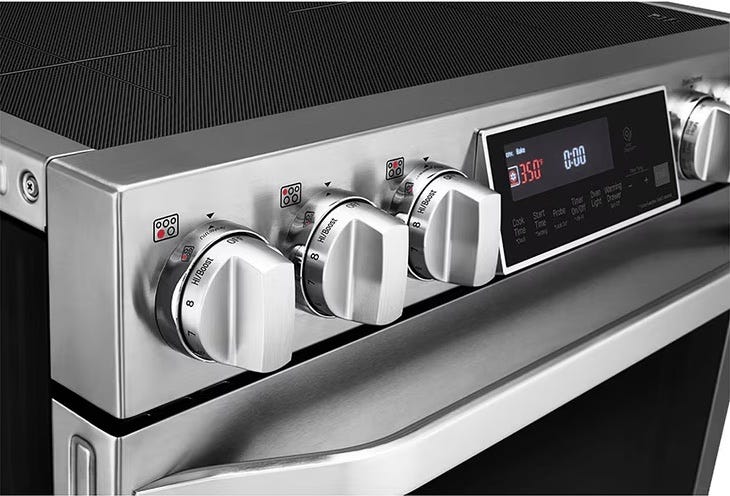Induction cooking is a key to accelerating global decarbonization. Only by replacing gas stoves wholesale can we electrify buildings fast enough to matter for the planet.
For that to happen, induction ranges and cooktops (like all new electrified appliances) have to be cost-competitive with gas, and ultra reliable. Which means manufacturers have to productize and design them to be robust and durable enough to last for a decade or more. But with all the electronic components involved, and the heat they must withstand, I wonder if this is as simple for induction as for gas ranges.
We bought an LG induction range in 2020 (model LSIS3018SS), and for three years, it was fantastic. We’d paid up for the higher-end unit with knobs and a convection oven. And boy did it deliver. The cooktop gave us ultra-fine temperature control, better than gas burners. It heated hot water in mere seconds. It was so easy to clean (just wipe the glass with a sponge). And the convection oven was the best oven we’ve ever owned.
We also felt safer and healthier after switching to induction. The burners shut off automatically if you leave them on by mistake, eliminating the chance of fire. There’s no chance of carbon monoxide poisoning, because you’re not burning anything. And unlike pollutant-spewing gas stoves (which can exacerbate conditions like asthma even if ’properly vented’), induction is 100% clean.
So we loved it. Until this past January, when the cooktop simply stopped working one day. After doing what we could to diagnose it (rebooting, checking error codes etc), we called LG, only to learn a service call would be $400, whether they could fix it or not (it only had a one-year warrantee, and we hadn’t bought the extended warrantee).
It took a few days to get the service scheduled, and when the guy finally came he spent three hours disassembling and reassembling the range. Only then did I realize that maybe there isn’t a deep bench of induction-range repair talent. These local repair guys who contract with LG mostly work on gas ranges, and this guy was clearly learning induction on the job.
Unable to pinpoint the problem, he ordered some replacement circuit boards and said he’d return in a few days to install them. Meantime the cooktop inexplicably started working again (the oven had kept working the whole time). So I told him not to bother, not wanting to spend another three hours with him. He said to hang on the replacement boards in case we needed them later.
Fast forward to June, and the cooktop stopped working again. We scheduled another repair guy (for another $400… LG won’t give credit for prior visits), but that ended up taking a couple weeks due to scheduling. Meantime we tried the cooktop every few days just in case it came back to life. Twice it did, but only for a few hours.
Yesterday we finally fixed the problem (I hope). Our second repair guy, Willie, really knew what he was doing, had the thing apart in fifteen minutes, and identified that the main circuit board had somehow become damaged, resulting in intermittent functioning.
Willie told me that the most common failures he sees in LG’s induction ranges are the circuit boards that control the cooktop, and those that control the display. Heat can damage them easily, he said, and there’s obviously a lot of heat around - like from the oven.
So my question is… why can’t they design for this? LG designs dishwashers, washing machines, and fridges that we expect to last a decade or more. Those have electronic components and circuit boards in them too.
Are induction ranges really harder to make reliable because of the heat, or does LG just not care enough about this product category to do the engineering work?
As a consumer, I want LG (or whoever) to stand behind my expensive appliance and make sure it keeps working for way more than three years; either that or to warrantee it for many years, not just one year.
I assume they’ll ultimately have to do that to be competitive. But right now, maybe it’s just too small a market for them to care? Come on, LG: you can do better.
P.S. Let me know if you’d have any experiences with induction range reliability… I’d love to hear them.
P.P.S If any LG big shots are reading this: do the right thing and improve your product reliability, or make repairs easy and free. And call me to refund my $800.







